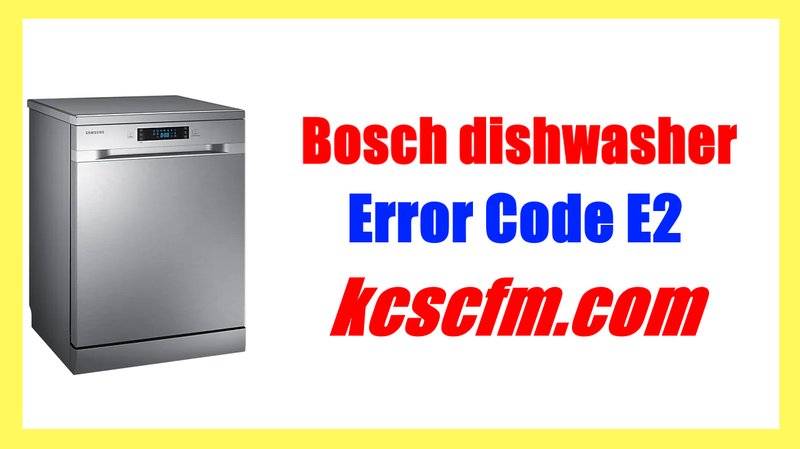
Here’s what you need to know: like many household appliances, Bosch dishwashers are equipped with a self-diagnostic system. When something goes awry, it alerts you with these error codes. E2 is often related to a heating issue, meaning your dishwasher’s heating element isn’t doing its job correctly. Now, this might sound technical, but it’s similar to when a kettle doesn’t heat water properly due to a faulty component. In many cases, this error can be resolved by some straightforward troubleshooting, but there are instances where professional help is necessary.
Understanding Error Code E2
To break it down, the E2 error is telling you that there’s a hiccup in the heating process of your dishwasher. The heating element is responsible for warming up the water to a suitable temperature to clean your dishes effectively. Think of this element like your dishwasher’s “internal stove.” If this part isn’t working, it’s as if you’re trying to wash dishes with cold water—not very effective, right?
Typically, this issue could stem from a few different sources: a malfunction in the heating element itself, problems with the thermostat, or even an issue with the wiring connections. It might be akin to trying to cook on a stove that’s lit but not heating—frustrating and ineffective. But here’s the catch—sometimes, the error is straightforward while other times, it might involve deeper issues like a faulty control board.
While it’s tempting to want to fix it yourself, understanding when to call a technician can save you time, money, and any further headaches. If you’re curious about checking things out, you might start by ensuring nothing is blocking the heating element and that all connections seem intact. However, if you’re not comfortable tinkering around, that’s okay—calling a professional might be your best bet to avoid risks.
When DIY Troubleshooting Isn’t Enough
Before dialing for help, here are some steps you can try. First, make sure the dishwasher is correctly loaded and that nothing is obstructing the spray arms or heating element. Sometimes, a poorly placed dish can block the heat, causing the sensor to think there’s a problem. It’s similar to how a blocked vent in your car might cause your engine to overheat.
Next, check the filter for any clogs. A clogged filter can interrupt your dishwasher’s normal operations, leading it to misread situations. Try resetting your dishwasher by unplugging it for a few minutes, then powering it back on. This is a bit like rebooting your computer when it freezes; it often works wonders for small glitches.
However, if these steps don’t resolve the issue, the problem may be more complex. Technical components like the heating element or thermostat might need repairing or replacing. At this stage, diving into DIY repairs without proper knowledge can lead to further damage or void your warranty. It’s usually wise to pause and call a professional.
Calling In The Experts
So, when exactly is it time to make that call to a technician? Here’s the deal: if the basic troubleshooting doesn’t clear up the E2 error, or if you notice recurring issues after a temporary fix, it’s a clear signal to consult a professional. Expert technicians have the tools and training to diagnose and fix the problem accurately. It’s like calling a plumber for that leaky faucet you can’t seem to fix; sometimes, professional intervention is the best course of action.
Moreover, if your dishwasher is under warranty, attempting extensive repairs on your own might void the warranty terms. A certified technician can ensure that the repairs are covered and done correctly, saving you from potential costly fixes down the line. Plus, they might spot other unnoticed problems that could be brewing, making sure your machine runs smoothly for future use.
Remember, it’s okay to seek help. Appliances are meant to make life easier, not add stress. If you’re unsure, or if dealing with electrical components feels daunting, a technician’s expertise is invaluable. Taking the right steps ensures your dishwasher—and your peace of mind—are well taken care of.
Preventative Tips To Avoid Future Errors
Prevention is always better than cure, and regular maintenance can significantly reduce the chances of encountering error codes like E2. One of the easiest ways to prevent errors is by ensuring your dishwasher is used properly and maintained regularly. Just like you wouldn’t run a marathon without keeping your body in check, your dishwasher needs regular tune-ups to function seamlessly.
Make sure you’re loading your dishwasher correctly, leaving adequate space for water circulation and avoiding overloading. Regularly clean the filter and remove any debris that might obstruct the spray arms or the heating element. Additionally, using dishwasher-safe cleaning solutions can help prevent mineral build-up that affects performance.
Another tip is to run a hot cycle with a cup of vinegar or a dishwasher cleaner every few months. This helps in keeping the internal components free of lime scale and detergent residue, ensuring everything runs like a well-oiled machine.
With a little care and attention, you can keep your Bosch dishwasher running smoothly, preventing those pesky E2 errors from cropping up. And if they do, you’ll now know exactly when it’s time to call in the pros. Keep your kitchen running smoothly, one cycle at a time!